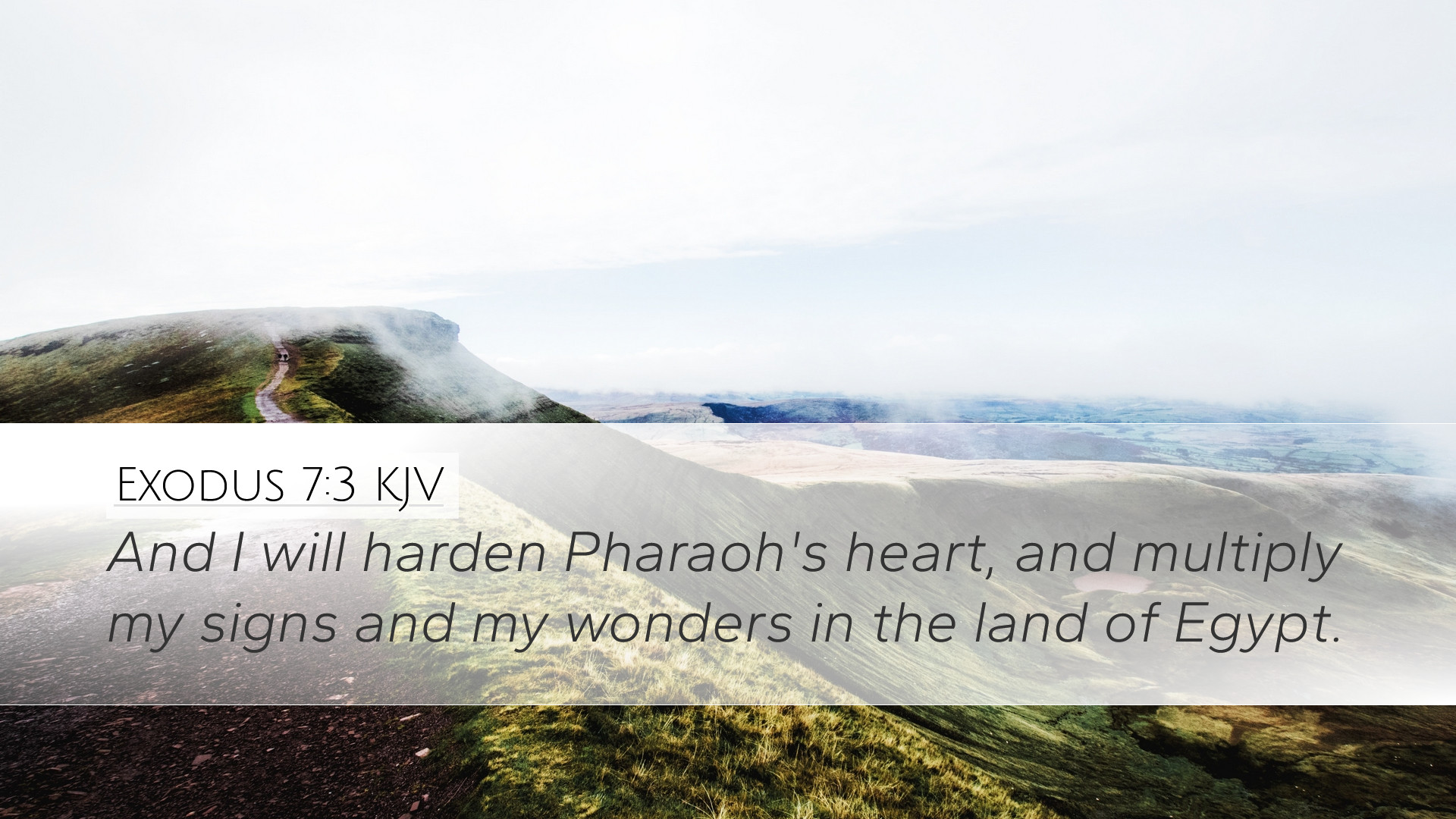Commentary on Exodus 7:3
Exodus 7:3 states: "And I will harden Pharaoh's heart, and multiply my signs and my wonders in the land of Egypt."
Introduction
This verse occurs at a critical juncture in the narrative of Exodus, where the conflict between God and Pharaoh escalates. It highlights God's sovereignty and the divine purpose behind the plagues that He sent upon Egypt. Various commentaries offer rich insights into the theological, historical, and literary significance of this verse.
Theological Insights
God's Sovereignty: One significant theme in this verse is the clear assertion of God's sovereignty over human affairs. Matthew Henry emphasizes that God is not merely a passive observer but actively engages in history. His intervention is purposeful, indicating that the hardening of Pharaoh's heart serves a divine purpose in planning to manifest His power through signs and wonders.
Judgment and Mercy: Albert Barnes points out that the hardening of Pharaoh's heart is a form of divine judgment. It showcases the tension between God’s grace and human resistance. While God is willing to demonstrate mercy, the heart of Pharaoh becomes hardened as a part of a larger narrative that demonstrates God’s omnipotence over false gods and the futility of human pride.
Historical Context
The context of Exodus 7:3 must be understood within the historical situation of Israel’s enslavement in Egypt. Adam Clarke provides a rich commentary on the significance of Pharaoh, who represents oppressive power contrasted with the faithful God of Israel. The plagues serve as a judgment not just against Pharaoh, but also against the Egyptian gods, illustrating God’s supremacy over all creation.
- The Role of Signs and Wonders: The signs and wonders mentioned are instrumental as they serve both to convince the Israelites of God's power and authority and to challenge the religious beliefs of Egypt.
- The Purpose of Hardening: The hardening of Pharaoh’s heart has dual implications—it is both a divine action and a human response to God’s overpowering will.
Literary Structure
The structure of Exodus is crucial for understanding this verse. The narrative technique employed by the author depicts the escalating confrontation between divine power and human obstinacy. Matthew Henry comments on the literary device of foreshadowing; the hardening sets the stage for the subsequent calamities that serve to reveal God’s glory.
Reflection on Spiritual Growth
For pastors and theologians, this verse serves as a profound reminder of the challenges in spiritual leadership and moral perseverance. The hardening of Pharaoh’s heart can serve as a cautionary tale about the dangers of resistance toward divine calling. Clarke elucidates that even leaders can become so entrenched in their perspectives that they fail to recognize God's unfolding plan.
- Importance of Humility: This narrative invites believers to cultivate a spirit of humility and openness to God’s direction.
- Call to Action: Pastors are encouraged to pray for soft hearts both in themselves and in their congregations, avoiding the pride that leads to hardening against God's will.
Conclusion
Exodus 7:3 encapsulates profound theological and ethical dimensions for understanding the nature of God’s engagement with humanity. The hardening of Pharaoh's heart, viewed through the lenses of Matthew Henry, Adam Clarke, and Albert Barnes, provides rich material for contemplation and application. As the narrative unfolds with the plagues, the ultimate message remains clear: God is supremely sovereign, His purposes are fulfilled, and His power is displayed among nations.


